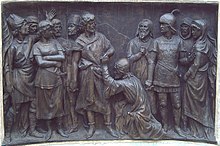Life Is a Dream
| Life Is a Dream | |
|---|---|

Detail from bronze relief on a monument to Calderón in Madrid, J. Figueras, 1878
|
|
| Written by | Pedro Calderón de la Barca |
| Date premiered | 1635 |
| Original language | Spanish |
| Subject | Free will, fate |
| Genre | Spanish Golden Age drama |
| Setting | Poland |
Life Is a Dream (Spanish: La vida es sueño [la ˈβiða es ˈsweɲo]) is a Spanish-language play by Pedro Calderón de la Barca. First published in 1635 (or possibly in early 1636), it is a philosophical allegory regarding the human situation and the mystery of life. The play has been described as "the supreme example of Spanish Golden Age drama". The story focuses on the fictional Segismundo, Prince of Poland, who has been imprisoned in a tower by his father, King Basilio, following a dire prophecy that the prince would bring disaster to the country and death to the King. Basilio briefly frees Segismundo, but when the prince goes on a rampage, the king imprisons him again, persuading him that it was all a dream.
The play's central theme is the conflict between free will and fate. It remains one of Calderón's best-known and most studied works. Other themes include dreams vs. reality and the conflict between father and son. The play has been adapted for other stage works, in film and as a novel.
Catholic Spain was the most powerful European nation by the 16th century. The Spanish Armada was defeated by England in 1588, however, while Spain was trying to defend the northern coast of Africa from the expansion of the Turkish Ottoman Empire, and the gold and silver that Spain took from its possessions in the New World were not adequate to sustain its subsequent decades of heavy military expenses. Spain's power was rapidly waning by the time Calderón wrote Life Is a Dream.
The age of Calderón was also marked by deep religious conviction in Spain. The Catholic church had fostered Spanish pride and identity, to the extent that "speaking Christian" became, and remains, synonymous with speaking Spanish.
Another current that permeated Spanish thinking was the radical departure from the medieval ideal that royal power resided in God's will, as noted in Machiavelli's The Prince (1532). Francisco Suarez’s treatise On the Defense of Faith (De defensio fidei, 1613) stated that political power resided in the people and rejected the divine rights of kings, and Juan Mariana's On Kings and Kingship (1599) went even further by stating that the people had the right to murder despotic kings.
...
Wikipedia
